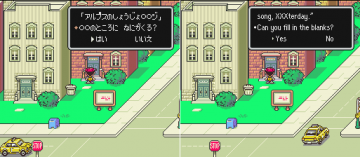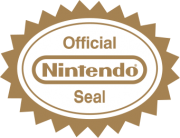Hello again! We talked for a bit previously about Our Plans For Releasing Shovel Knight In Additional Regions. Let’s go into more detail about what we’re at work on and what steps await us! A lot of these steps might not be new information for many of you out there, but I hope it can help clarify where we’re at in the process. Releasing the game in these regions is our topmost priority right now. We’re sorry that this delay has even occurred!
Note that some of these details may be specific to Shovel Knight! These steps can occur in different orders or in parallel depending on a game’s development cycle and all projects can face unique challenges. Also this status is only for the release of Shovel Knight on the Nintendo Wii U and 3DS since the PC version is already available worldwide. Alright, here we go!
Update: November 5th, 2014: Shovel Knight is out now, right this very moment, in Europe and Australia for the Wii U and 3DS!! Reade more here.
Update: October 14th, 2014: Believe it or not, we can finally confirm that Shovel Knight will be releasing in Europe and Australia in November for the Wii U and 3DS!! Reade more here.
Update: September 19th, 2014 : Final Testing has drawn to a close! We’ll be shipping up and shipping it out the door! If no unforeseen issues arise, then a solid release date will be coming into focus soon!
Update: September 4th, 2014 : Shovel Knight has received a “PG” rating from the Australian Classification board! Thank you to everyone involved there as well as the incredibly helpful staff at Nintendo Australia!
Update: July 31st, 2014 : With localization in hand, the European region is one step closer!
The Story So Far…
An active blue flame checkpoint means that step is done!



What Does This All Mean?!?!
Wow! That’s a lot of steps. Let’s break down what each step means exactly.
External
Phases which require coordination with outside people, teams, and organizations. These teams work hard but they also have their own systems, schedules, and structures in place. We’re not the only game in the world and so we can’t expect every team to drop what they’re doing and immediately focus on only us. Often times working three times as hard does not get the game done three times as fast as these require back and forth communication. As both the development team and publisher, the timing of our game’s release is ultimately our responsibility! An external step appearing to be late means that we were late in initiating the step, with the exception of some special circumstances.
Major Game Development
Core work on the game has come to a close with no more big changes in the future (meaning version 1.0 of the game). Since most future steps depend on this content remaining unchanged, it’s important that this is nailed down. To make sure the game was absolutely where we wanted it to be, we were changing flow, script, and more up to the last minute – just days before the final English version was completed!
Ratings
This describes sending the game to appropriate ratings boards for release in specific regions. Titles released in the United States must be reviewed by the ESRB, Europe requires PEGI, and sometimes a release for a single console region can require multiple ratings. Releasing in all European territories would require a PEGI and USK rating, since it includes Germany as well. Meanwhile, Australia has COB and Japan has CERO.
Different ratings administrations have different processes for what they need to see before they can evaluate a game for rating. A company could request that all major gameplay is recorded– others might only request a highlight reel. Some territories are very easy to deal with while others require extremely complicated steps that sometimes require the support of a 3rd party company or publisher. Some rating boards might want to play through the entire game firsthand!
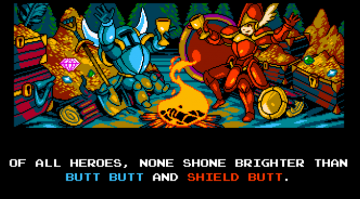
We recorded over 30 minutes of the famed Butt Mode to make sure our little joke wouldn't impact our plans for an E rating!
At some times, development teams may choose to make changes to the game content in order to meet the requirement of a certain rating. Especially when a single unintentional phrase, graphic, or scene can raise the rating for the entire game.
EU: This can sometimes be a tricky, prickly, or otherwise drawn out process. We were fortunate to receive tremendous support for having our ratings complete in a timely manner. Our thanks to everyone involved and especially to Nintendo of Europe for their help!
Localization
Translating the game into other languages can be quite a bit of work! The specifics for what languages are required for each platform and region can vary. For example, sometimes, for one reason or another, it makes sense to release a game only in English in all territories. However, we as a team decided that Shovel Knight would be served best if it could be experienced by everyone in their native language.
We’re working with a passionate team of people to see that the is game translated into French, Italian, German, and Spanish for the European release. We’d like to add additional languages in the future, but as a small team we have to take things one step at a time.
Note that translating a game goes simply beyond just flipping a language switch. It may also include making sure jokes and ideas in the game still make sense and are relevant in another country. It could be possible that using a certain word in a specific context could be offensive in another country or be tied down to a particular historical context that causes you to lose sight of the original English meaning. Lots of jokes, like puns, may make sense in English, but when translated they lose their original appeal because they are no longer puns! EarthBound is a famous example of how drastic localization changes can be. This cool page goes into a few of the different categories of the changes made to get the game ready for an American audiences.
Its tempting to think that a silly platforming game doesn’t have that much text but it really begins to add up once you count each line found in dialogue, menus, and message prompts! As it stands right now, Shovel Knight contains over 11,000 words! That’s the equivalent of a 50 page novel! Don’t forget details like eManuals and game descriptions– they need to be accurately translated with the same care as the game!
Localization Implementation and Testing
Now that the text has been translated it’s time to get it into the game and make sure it’s all working! All menu and dialog in the game needs to be verified in all languages to make sure that no unintended issues popped up. Text needs to appear properly, special font characters need to work, and more! Often, text has to be fit into small areas for menus, dialogue boxes, etc and the translation needs to be verified in all languages that nothing graphically looks incorrect. German translations often can lead to text that is twice the size of English – so making sure the text all fits properly can be quite a challenge!
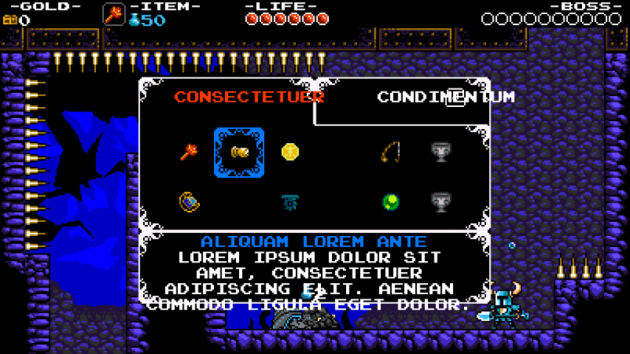
Just one example of how new text can go horribly wrong! Both teams work to avoid situations like this in advance but we can't be absolutely sure without testing!
This step and the previous usually bounce back and forth. Translation members may elect to play through the game to make sure their text makes sense in the context of the game. Some text might need to be re-evaluated for brevity, etc.
Final Testing
Any change, no matter how slight, can cause unforeseen issues! A game as big as Shovel Knight is almost like a game of Jenga, one small movement of a piece could make the whole thing fall apart! We need to put the entire game through its paces (on all platforms) before we can fully sign off!
Certification
Certifications means sending the game to the platform holder/publisher for final verification. This process ensures that the game is fit to play on your platform of choice – usually involving the platform holder such as Nintendo to do heavy testing on the game to make sure it doesn’t crash, follows all their rules, and in general, makes their device look good! As the developer, we do our best to catch any issues we can but some tricky or specific issues may go unnoticed or we may not even know they are issues the platform holder cares about!
The same could be said for many steps here, but it’s important to note that this is more than just a hoop to jump through. This level of verification is important for ensuring that a game meets expectations. With so much quality, they should make a seal for it!
If a submitted game fails to pass Certification then it will bounce back to us. We’ll make the changes necessary, do another round of Final Testing, and send it back! Around this time, we’ll be able to get estimates so that we have an idea of a possible release date window. Any time the game fails to pass, this step could put that estimated release date in danger!
Note that this certification process is separate for each region! Our European build may have different requirements than our North American version and therefore, both territories have completely separate approval processes!
Preparation and Release
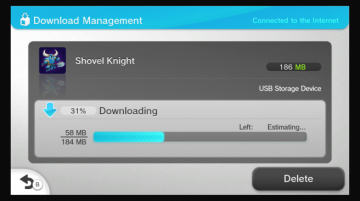
You're almost there, good sir knight!
With the final version of the game in hand, there is typically some additional lead up time before the game finally goes live and is ready to go on your system. It’s during this time where Nintendo would be preparing the game for release on the store, and we’d be obtaining Backer codes for Kickstarter backers or press outlets. This is also when a surefire set-in-stone date is known by all!
Publisher (Japan Only)
For release in Japan, the rules require we must also find a publishing partner who operates in Japan. We hope we’ll have some exciting news to talk about soon!
Business Work! (Chance Time)
Sometimes our impeccable plans must be suddenly pushed aside for all matter of business needs. A wild contract has appeared! Forms need to be methodically filled out! Or even worse: something we don’t even know about! As a cool game company we occasionally need to double check our business work –especially when operating outside our own backyard. This one is a little more nebulous but takes up our time just the same! The dev-duo at Powerhoof recently discussed a similar situation but they seem to be taking it all in stride!
Let’s All Get Shoveling!
As you can probably see, releasing one game in every territory in the world is not a small amount of work, especially for a team of half a dozen people. That said, any amount of work can be conquered, and so we’re doing our best to get this game out to everyone as fast as we can!! All lessons learned here will help us know what to expect next time around, and plan even better for a simultaneous worldwide release for new games! We’ll try to keep this page updated in the future, so if you’re curious about how long it is until you can see Shovel Knight in your territory, keep this page bookmarked! Thanks again, and I hope everyone can enjoy Shovel Knight soon!
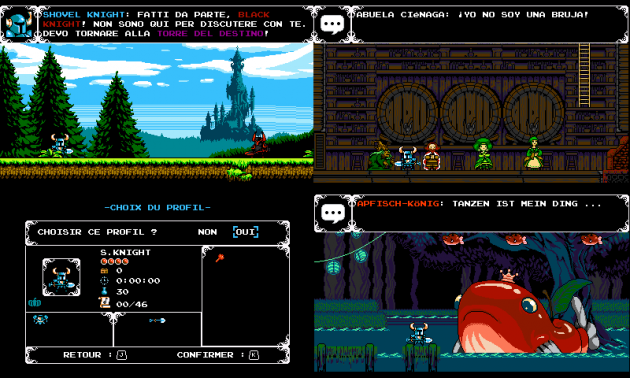
Translated versions of Shovel Knight are beginning to take form! (Note this screenshots is of still in progress work!)

